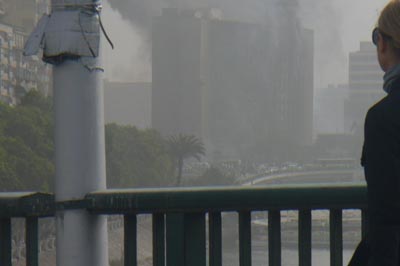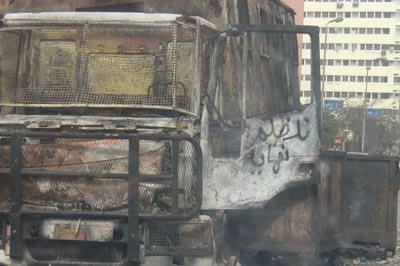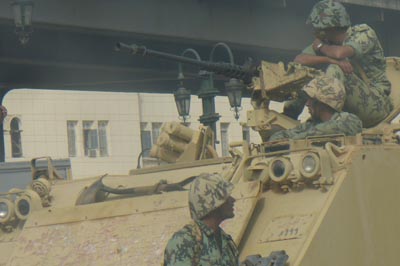
Since the demonstrations on Tuesday, nobody in Egypt really knew what would transpire next. On the one hand, thousands of people showed, but then again, this was not the first protest during Mubarak's thirty year reign and it was only concentrated in one section of the city. Wednesday and Thursday were relatively normal. There was a noticeable increase of police, but life pretty much went on. I had no problems walking with a friend to Zamalek with a friend via the October 6th Bridge.
We knew that Friday would be a decisive moment for the protesters. On a day where everyone is off from work, and most attend Mosque in the morning, the people would be ready to demonstrate and they would not need telecommunications to organize. Tellingly, it was a massive revolt on a Friday afternoon in Tunisia that led to President Ben Ali's decision to flee his country.
January 28, 2011
The day began with an upsetting omen. Internet and cell phone service had been terminated throughout the whole country. There was no way for me contact anyone from the outside world.

Like millions both inside and outside of Egypt, most of my Friday was spent plopped in front of the television set watching the latest news from BBC World and Al Jazeera. It was soon apparent that the demonstrations were quickly spiraling out of control. That being said, they were mainly concentrated around areas with a heavy police presence (like the October 6th Bridge) and I did not have a problem heading out of my apartment in Mohandesin to get lunch a few blocks away.
After about four hours of watching the news, I decided to take a nap. I was awoken soon after when my roommate Ahmed asked me to come with him to grab some water from across the street. Encouraged by the normalcy of Mohandesin earlier in the day, I decided to go with him.
The fifty foot walk would not be one that I would soon forget. On our normally quiet side street, there were droves of young Egyptian men coming home from the protests; some of them were noticeably gagging from the tear gas, almost all of them looked very agitated. We made it to the tiny convenience shop, grabbed our waters, and went straight back to our apartment. Upon our return, our roommates notified us that a curfew was in place, the police force had disbanded, and there were reports that looters were beginning to take over the streets.
January 29, 2011
When I woke up, it was made immediately clear that there was no other option than to leave Egypt. There were rumors that prisoners had escaped from the prisons and that youths had broken into abandoned police vehicles and stolen weapons. No matter the validity of these stories, walking around in the daylight I could see first-hand that Mohandesin was in shambles. Stores that I had once frequented were ransacked.
At this time, things were still incredibly hectic. Use of the internet and cell phones was still blocked, we did not have access to a car and the taxis and buses were not running. We were stressed out, afraid, and on little sleep. We pretty much had no clue of what to do.

The plan was to go to a school across the street hoping that we could access a landline telephone. Supposedly, this "ancient" way of communication could still make international calls. If that failed, our next line of action was unclear. Should we find search for a grocery store still in one piece and stock up? Should we walk to the German embassy in Zemalek (the United States embassy was across town)? Should we head to the nearby EgyptAir office to see if flights were still running?
Miraculously, right before heading out to the school, cell phone service was restored, but ever so slightly. After many fruitless attempts to call home, I finally decided to reach the US embassy. Asking for guidance of what to do I was transferred to a voicemail box. They seemed to be overwhelmed as well.
About an hour after cell phone service was established, I got a call from my father! It was around 4 AM on the east coast, but he had continuously been trying to reach me just as I had tried to call him. My dad notified me that the family of one of his Egyptian colleagues was on his way to pick me up.
After a bit of confusion, I was finally able to meet up with Ahmed El Mallah and his mother. The drive to their apartment was like none other. We drove right past the still burning headquarters of Mubarak's National Democratic Party. Destroyed riot police vehicles lined the road. Moreover, I was able to view how the Egyptian populace welcomed the presence of the military, conversing (not clashing) with the soldiers stationed in the city.
The gratitude that I owe to the El Mallah family is hard to qualify with words. When I arrived at their home, I was provided with food, a shower, and if need be a place to sleep. Their country was in peril, yet their generosity to me, a stranger, will never be forgotten.
Getting in touch with a travel agent, I was able to secure a flight to Tel Aviv (where I have family) via Athens. There were no assurances that the plane was going to leave, but nevertheless the plan was for Ahmed's older sister Reem to take me to the Cairo International Airport and I would figure things out from there. Before leaving I saw on the television that a city-wide curfew was being implemented at 4 o'clock; it was 3:50 PM.

When I arrived at the airport, it was chaos. The terminal was packed and the flashing video screens showed that at least half of the flights had been cancelled. At this point, I didn't really care. This meant that at least half of the flights were still a go and I was even prepared to sleep at the airport if need be. I said goodbye to Reem and thanked her and her family as much as I could while wishing her a safe drive home.
After two hours of waiting for my 9 PM flight we were informed that the airplane had taken off from Athens to Cairo meaning that we were guaranteed a place on the return flight to Athens.
As excited as I was, I would soon receive a phone call from my roommates who opted to stay in Mohandesin. They were terrified. The looting was even worse on this night. Outside their door, they could hear people trying to break into their apartment building. I offered them as much encouragement as I could but I was honestly very scared. I continued to call them for updates and was finally put at ease when they told me that things had died down a little and that residents of the neighborhood were grouping with whatever they could (sticks, knives, etc.) to protect the streets. (It would not be until later that I would find out that they made it to the airport safely the next day)
Thankfully, the rest of my journey was relatively straightforward. The flight out of Cairo left on time and landed in Athens to a huge applause from the relieved passengers.
I arrived in Israel at 3 AM on January 30, 2011. I was unshaven, exhausted, and stressed. The events during the previous two days flew by in such a whirlwind that I had no time to reflect on what actually occurred. I did not care. I was safe.